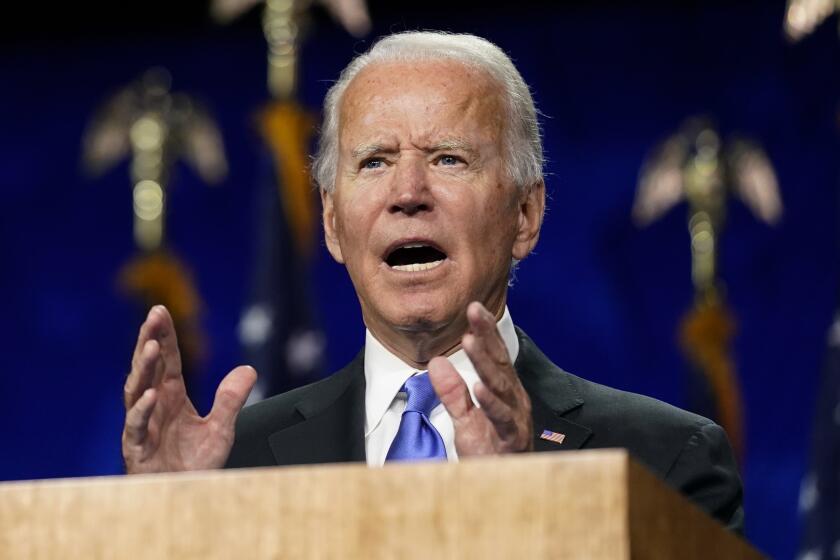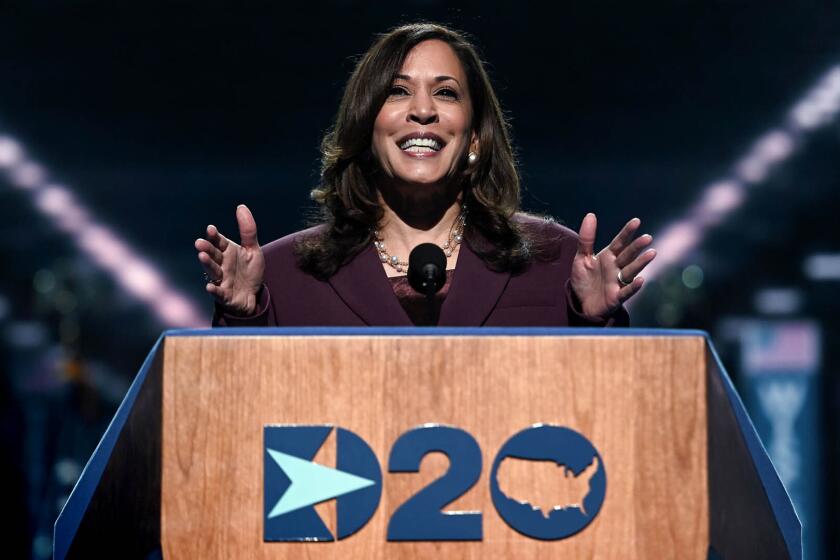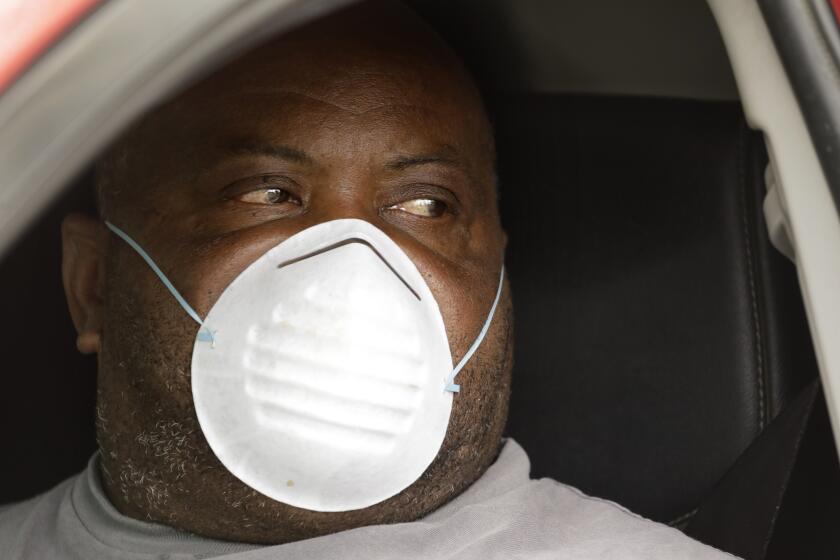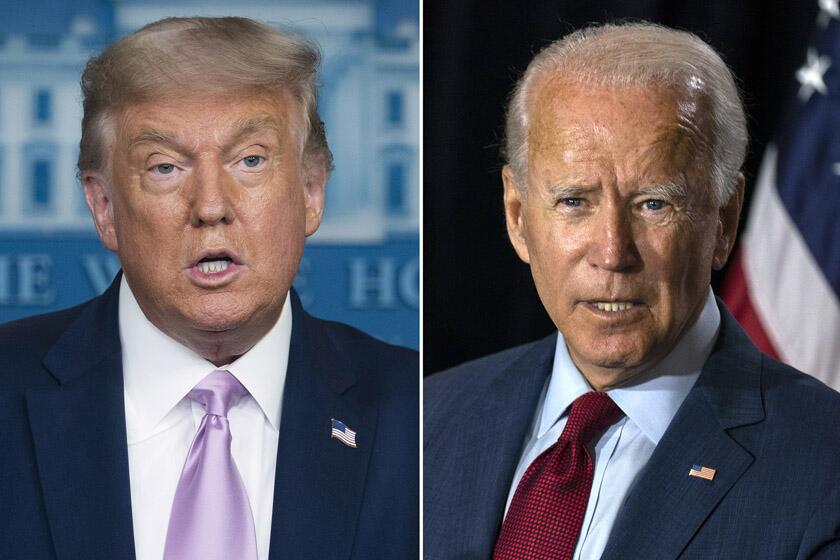Biden and Harris respond to Trump’s attacks before the RNC
WASHINGTON — Joe Biden, girding for a week of attacks at the Republican National Convention, previewed his response Sunday by laughing off questions about his mental acuity, denying he supported defunding the police and leaping to defend his running mate, Kamala Harris, against President Trump’s insults.
Speaking on ABC, in the Biden-Harris ticket’s first joint television interview since being formally nominated at the Democratic National Convention last week, the two downplayed their many differences as rivals during their party’s primary contest, including an intense debate exchange in which Harris questioned Biden’s record on school busing and desegregation.
Sidestepping repeated questions about the debate, Harris closed ranks behind Biden: “I want Joe Biden to be the next president of the United States. I believe in Joe Biden. Frankly I think this conversation is a distraction from what we need to accomplish right now and what we need to do.”
Asked to respond to Trump’s attacks on her as “mean,” “nasty” and “disrespectful,” Harris laughed and dismissed the insults as a diversionary tactic.
“I think that there is so much about what comes out of Donald Trump’s mouth that is designed to distract the American people from what he is doing every day,” the California senator said. “That is about neglect, negligence and harm to the American people.”
Biden jumped in to add that Trump was incompetent and that his attacks were out of bounds and unpresidential.
“The idea that he would say something like that, no president — no president — has ever said anything like that,” Biden said. “No president has ever used those words.”
Joe Biden made his case for a major course correction in America, laying out his vision for a return to calm and stability as he accepted the Democratic presidential nomination.
The interview gave voters the first unscripted, extended look at the dynamics between the running mates, a historic pairing between a 77-year-old white man who, if he wins the presidency, would be the oldest person to assume the office, and a 55-year-old who is the first Black woman and first Asian American on a national party ticket. Biden and Harris have made joint campaign appearances, and they sat for a joint interview with People magazine last week. But ABC was granted the first broadcast interview, which was conducted by David Muir and Robin Roberts.
Despite their differences of background and generation and their sometimes-bitter competition during the primary, Biden and Harris have a relationship of some warmth and affection because Harris, while serving as California’s attorney general, had been close to Biden’s late son, Beau, then the attorney general of Delaware, who died of cancer in 2015 at age 46.
Biden said that choosing Harris as his running mate was “an easy decision to make” and that it was not driven by pressure to choose a Black woman for his vice presidential nominee.
“I didn’t feel pressure to select a Black woman,” he said. But he added: “The government should look like the people, look like the country.”
“I cannot understand and fully appreciate what it means to walk in her shoes,” he said. “What we do know is that we have the same value set.”
The two had an easy rapport with each other in the interview, although they sat at a significant distance from each other and the interviewers in accordance with health protocols during the COVID-19 pandemic.
Both went to great lengths to move beyond past disagreements, including the debate episode that was one of the most dramatic confrontations of the primary season: Harris’ surprise attack on Biden for his past opposition to mandated school busing and for comments he’d made about working with segregationist senators, which she described as “hurtful.”
Harris declined to say how they had put the issue behind them, but Biden said they had moved past it.
“I sense exactly where she was coming from,” Biden said. “I think a lot of people, and maybe even the senator at the time, didn’t know the depth of my record. We’re on the same exact page about what the possibilities are right now.”
Harris also declined to criticize Biden for controversial campaign-trail comments that African Americans who were still trying to decide between him and Trump “ain’t Black.” Biden later apologized for the remark. Harris said, “I know where his heart is.”
The two running mates also shrugged off past disagreements over healthcare. Biden opposes Medicare for all; Harris has supported it, although she also backed a modified version that allowed continuation of private health insurance.
“I want to fix the problem,” Harris said. “And Joe has a plan to fix the problem, and I’m fully supportive of it.”
California’s junior U.S. senator, the daughter of Indian and Jamaican immigrants, accepts the vice presidential nomination, making history on Day 3 of the Democratic National Convention.
It remains to be seen in the coming weeks exactly what role Harris will play in the campaign. For now, both nominees are sticking to virtual campaigning and lying low while the spotlight turns to Trump and his party during this week’s GOP convention. The ABC interview gave Biden and Harris a chance to answer some of the criticisms that Republicans are expected to highlight.
When asked about Trump’s questions about his mental acuity, Biden laughed and welcomed the comparison to Trump’s fitness.
“Watch me,” he said. “Mr. President, watch me. Look at us both, what we say, what we do, what we control, what we know, what kind of shape we are in.”
Trump hailed his own mental acuity by boasting he “aced” a cognitive test, although the test questions are mostly rudimentary. Biden has brushed aside Trump’s suggestions that he should undergo such testing.
When Biden was asked about statements the former vice president made that he was a transitional figure in the Democratic Party, he denied that meant he intended to be a one-term president. He said he “absolutely” would consider serving two terms.
A central GOP line of attack is that Biden is not the political moderate that he claims to be; Republicans sometimes portray him as a Trojan horse for the party’s extreme left wing. In the interview, Biden denied — as he has on many occasions — that he supported defunding the police, which is a rallying cry of many Black Lives Matter activists and other progressives who believe that public resources should be shifted from armed law enforcement to social services. Biden’s criminal justice plan calls for increasing funding for community policing.
“I don’t want to defund police departments,” he said. “I think they need more help; they need more assistance.”
Much of the Democratic convention spotlighted criticism of Trump’s handling of the coronavirus crisis, which has killed more than 176,000 people in the U.S. and led to economic calamity. Trump for months insisted that the outbreak would “eventually disappear” and pressured governors to lift stay-at-home restrictions. In the ABC interview, Biden said he would take far stricter actions — even imposing severe quarantine restrictions on the country — to contain the virus’ spread if scientists said they were necessary.
Trump and Biden diverge on the coronavirus pandemic, Obamacare, Medicare and Medicaid, abortion rights, and how to rein in prescription drug prices.
“I will be prepared to do whatever it takes to save lives because we cannot get the country moving until we control the virus,” Biden said. “That is the fundamental flaw of this administration’s thinking to begin with. In order to keep the country running and moving and the economy growing, and people employed, you have to fix the virus, you have to deal with the virus.”
And if scientists said it was necessary to shut the country down to do so, Biden said, “I would shut it down; I would listen to the scientists.”
A look at where President Trump and Joe Biden stand on key issues in the 2020 election, including healthcare, immigration, police reform and climate.
More to Read
Get the L.A. Times Politics newsletter
Deeply reported insights into legislation, politics and policy from Sacramento, Washington and beyond. In your inbox three times per week.
You may occasionally receive promotional content from the Los Angeles Times.















